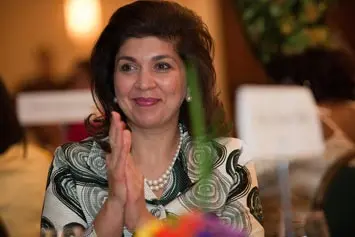Women's Summit Takeaway: ‘More Women Leaders’

06/07/2013
By Sandra Seitz
The celebration dinner that concluded an international conference on women in public service sounded, at times, like a political rally, as audience members applauded enthusiastically at every mention of a woman in a leadership role.
The conference at UMass Lowell was part of the Women in Public Service Project (WPSP), an initiative co-founded in 2009 by Secretary of State Hillary Rodham Clinton, the U.S. Department of State and five women's colleges to support leadership development of girls and women.
WPSP has expanded through a consortium of public universities: University of Massachusetts, San Francisco State University, Arizona State University and the University of Maryland.
“Throughout my career, I’ve supported the advancement of women to leadership positions,” said UMass Lowell Chancellor Marty Meehan in opening remarks. “It’s clear to me that if we had more women as heads of state, the world would be a more promising, hopeful and less violent place.”
Invited delegates at the coference included women leaders from Northern Ireland, Liberia, Afghanistan and Turkey, all nations recovering from conflict, and women in public service from across New England and the United States.
“We understand that peace does not result from a ceasefire, but comes with the establishment of equitable distribution of resources,” said Paula Rayman, director of the Middle East Center for Peace, Development, and Culture and of the Peace and Conflict Studies program at UMass Lowell.
The evening’s keynote speaker, Farah Pandith, special representative for Muslim Communities at the U.S. Department of State, was appointed to the position by then-Secretary of State Clinton. Executive Vice Chancellor Jacqueline Moloney presented Pandith with the inaugural UMass Lowell Public Service Award.
In introducing the award, Moloney said, “Since her swearing in, Pandith has traveled to more than 80 countries and launched youth-focused initiatives including Generation Change, Viral Peace and Hours Against Hate, a campaign that was a partner with the London 2012 Olympic and Paralympic Games. She is also a key architect of the Women in Public Service Project.”
Compelled to Serve
Pandith, a Massachusetts native, described her own path to public service.
“At the time of 9/11, I was working in an office building overlooking Logan Airport,” she said. “I loved being in Boston and I loved my job in the private sector.
“In the days after the attack, we found out about this organization called al-Qaida. They claimed to define my country and they claimed to define my religion,” she said. “I walked in to see my boss and told him that I had to get to Washington. I felt compelled to serve my nation.”
With the help of bipartisan support from her colleagues, Pandith made the change, working first for the U.S. Agency for International Development and then in a series of positions within the State Department, culminating in her current post. In January 2013 she was awarded the Secretary's Distinguished Honor Award for “exceptionally outstanding service.”
“Secretary Clinton asked me to focus on the Muslim youth, to make it a priority to find ways for them to lift up their voices,” said Pandith. As an example, she and a colleague founded Hours Against Hate, a social media campaign built on the concept of volunteering time for others. It asks young people to spend an hour or more with someone who does not look, live, love or pray like them — to walk in someone else’s shoes.
Women of the Arab Spring
Documentary filmmaker Gini Reticker, whose work has won an Emmy and been nominated for an Academy Award, was honored by UMass Lowell for her portrayals of women seeking justice. The trailer of “Awakening” was screened; the new work features the role of women in the revolutions in Libya, Tunisia and Egypt.
“Instead of ‘Awakening,’ I should call this film ‘Invisible Women,’ ” said Reticker. “Women have played an incredible role in Liberia and in the Arab Spring revolution, but they are described in the media as secondary supporters. Really, they are the foundation and they raise the important issues of building a better society.”
Reticker discovered the remarkable story of Liberian women who came together to end a bloody civil war only “by overhearing the women talk to each other about the events,” she said. The award-winning result, “Pray the Devil Back to Hell,” featured UMass Lowell’s own Greeley Fellow Leymah Gbowee, who later received the Nobel Peace Prize.
Deina Abdelkader, UMass Lowell assistant professor of political science, commented on how women are overlooked by media and in history.
“Across the ages, women have fought for independence, joined uprisings and made demands for change,” said Abdelkader, author of the book “Islamic Activists” and a member of the Islamic Jurisprudential Council of North America. “Then, as resources are distributed, women don’t get anything. Promises don’t materialize into rights.”
